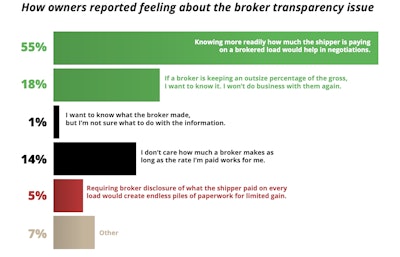DOT Secretary Sean Duffy had a recent media blitz unveiling a "pro-trucker" package promising more money for truck parking, streamlined regs, and "cracking down on illegal brokering."
The truck parking and regs components of that package are straightforward. DOT will invest $275 million in truck parking, especially along I-95 in Florida, withdraw the speed limiter rulemaking, revamp the DataQs process, modernize the National Consumer Complaint Database and study more split sleeper berth options.
But what about "cracking down on illegal brokering?"
Anyone who spends time on load boards knows that fraud and double brokering have twisted the industry in knots, putting brokers on the defensive and giving rise to an entire "carrier vetting" ecosystem that often falsely flags carriers as risky while doing almost nothing to stem the rising tide of cargo theft.
Overdrive inquired with the DOT and the Federal Motor Carrier Safety Administration about what exactly they'll do to combat what it refers to as "unlawful double brokering."
[Related: The double brokering slow burn -- how it happens, and how to fight back against it]
Will FMCSA again begin issuing $10,000 civil penalties for perjury and "chameleon carriers" not disclosing affiliations? Does DOT mean to say that FMCSA's major registration system overhaul will address freight fraud?

A DOT spokesperson didn't directly address those points, but instead, when asked point blank what it was doing on "illegal brokering," the department may have dropped a major hint about how it's leaning on the most divisive issue in freight -- broker transparency.
"To promote fairness and stability of the industry, FMCSA is renewing its focus on combating unlawful double brokering -- a practice that directly harms drivers," the DOT spokesperson said.
That renewed focus "includes reviewing the entire portfolio of regulatory actions listed in the Fall 2024 Unified Agenda (Current Unified Agenda of Regulatory and Deregulatory Actions), including the broker transparency rulemaking proposal.”
FMCSA in November of 2024 issued a Notice of Proposed Rulemaking in the Federal Register that would amend the existing broker transparency regulations in 49 Code of Federal Regulations 371.3 in a way "intended to reinforce broker transparency for motor carriers and to better tailor the required contents of the records to the purpose of broker transparency.”
FMCSA noted in its proposal that while the current regulations intend to provide broker transparency, the reality is that “broker transparency is rare in practice. The agency believes the revisions to the regulation will make it more likely that brokers will comply with their regulatory duty to provide information.”
FMCSA sought to achieve that by doing the following:
- Requiring brokers to keep records in an electronic format
- Revising the required contents of brokers’ records
- Requiring brokers to provide records upon request
- Requiring that records be provided within 48 hours of request
FMCSA's broker transparency NPRM proposed turning what was previously a "right" of carriers to review records of brokered freight transactions -- a right carriers often waive in contracts with brokers -- into a "regulatory obligation" for brokers.
A "regulated entity must adhere to the regulations and cannot ‘disguise its regulatory obligations as contractual ones,’” FMCSA said in the NPRM.
Brokers, predictably, didn't like the rulemaking, but Overdrive polling found 74% of readers supported broker transparency enforcement. As a lot of freight issues do, the public discourse over broker transparency devolved into hypotheticals on rates impacts, but FMCSA's NPRM received comments highlighting the fairness and fraud-fighting aspects of broker transparency too.

Broker transparency as an anti-fraud measure
Attorneys Henry Seaton and Mark Andrews, representing the Transportation Lawyers Alliance, commented on FMCSA's broker transparency NPRM arguing that broker transparency is "essential to determine regulated carriers’ compliance with rules of commerce for civil and criminal litigation, to address carriers’ rights in broker bankruptcies, as well as to facilitate production of records essential for the tracing of both stolen freight" and brokers' embezzlement of money rightly meant for trucking companies.
[Related: Trucking attorneys: Broker transparency needed to fight fraud]
"Unfortunately, much of the 'transparency' rulemaking has gone off the tracks with a lengthy treatment of the existing brokerage regulations without considering their purpose in preventing fraud and holding intermediaries accountable with a timely and proper transmission of earmarked funds to the carrier upon receipt," the lawyers continued. "The federal recordkeeping requirements of 49 CFR Parts 371 and 378 provide access to broker and carrier transactional records useful to protect victims’ rights in civil and criminal litigation as to fraud, embezzlement, larceny by fraud, and other statutes."
Dale Prax, FMCSA's "worst critic" and someone who has an audience with the agency's leadership, also made the anti-fraud case for broker transparency enforcement.
[Related: Brokers plan to fight FMCSA's transparency push]
"In the context of freight brokerage, brokers act as fiduciaries, holding payments collected from shippers in trust for the carriers," Prax told Overdrive. "By complying with 49 CFR § 371.3, brokers uphold their fiduciary duty, ensuring transparency, proper allocation of funds, and the prevention of fraud or misappropriation."
Of course, while DOT did especially highlight the broker transparency push as one element of its "illegal brokering crackdown," it also mentioned the entire Fall 2024 agenda, which includes lots of other items like ELD regs revisions, a rulemaking to help remove medical examiners from the registry, and one item that intends to streamline states' issuance of non-domiciled CDLs.
 Here are all the items on DOT's Fall 2024 agenda that involve FMCSA.
Here are all the items on DOT's Fall 2024 agenda that involve FMCSA.










